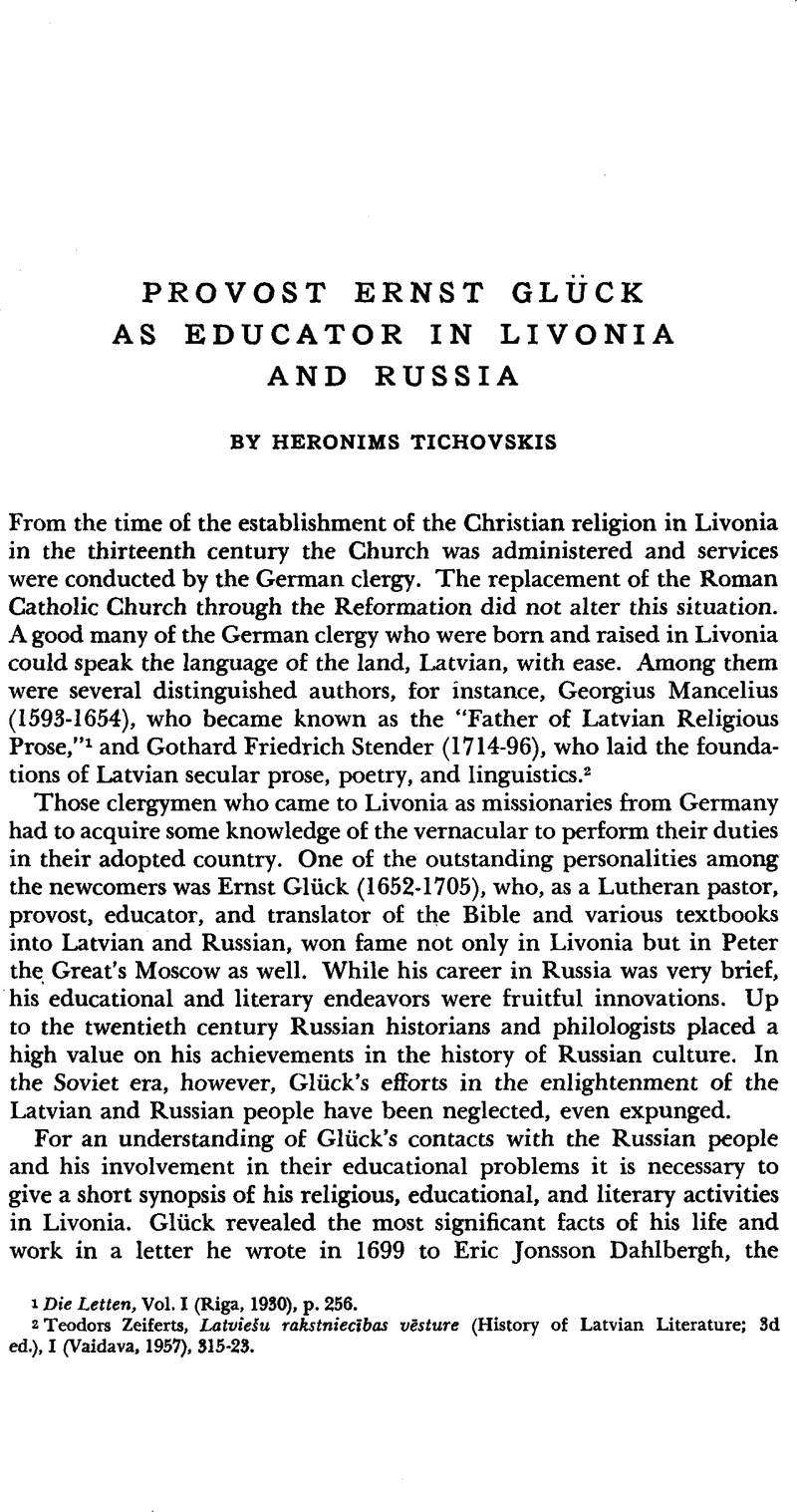No CrossRef data available.
Published online by Cambridge University Press: 27 January 2017

1 Die Letten, Vol. I (Riga, 1930), p. 256.
2 Teodors, Zeiferts, Latviešu rakstniecības vēsture (History of Latvian Literature; 3d ed.), I (Vaidava, 1957), 315–23.Google Scholar
3
![]() , I (St. Petersburg, 1862), 126-27.
, I (St. Petersburg, 1862), 126-27.
4 From 1629 to 1721 a part of Livonian territory (called Swedish Livonia) was under Swedish rule.
5 Latvju Enciklopēdija (Latvian Encyclopaedia), comp. Arveds Švābe (Stockholm, 1952- 53), III, 2694.
6 For Edzardi see Allgemeines Gelehrtenlexikon, comp. Ch. G. Jöcher, II (Leipzig, 1750), 281.
7 Latviešu literātūras vēsture (History of Latvian Literature), ed. L. Bērziņš, II (Riga, 1935), 60.
8 E. Blese, Latviešu literātūras vēsture (History of Latvian Literature; Hanau, 1957), pp. 101-8.
9
![]() , p. 127.
, p. 127.
10 Quoted in Bērziņš, L., Ernst Glück (in Latvian; Riga, 1935), p. 34.Google Scholar
11 Quoted in Long, Jacobi Le, Bibliothecae Sacrae, Part 2 (Leipzig, 1709), p. 358.Google Scholar
12 Arnolds, Spekke, History of Latvia (Stockholm: M. Goppers, 1951), p. 268.Google Scholar
13
![]() , IV (St. Petersburg, 1863), 129-30.
, IV (St. Petersburg, 1863), 129-30.
14
 , 1907, pp. i-xii.
, 1907, pp. i-xii.
15 Bērzinš, Ernst Glück, pp. 34 ff.
16
![]() , pp. iv and 43.
, pp. iv and 43.
17
![]() , I (Moscow, 1845), 126.
, I (Moscow, 1845), 126.
18
![]() , p. 128.
, p. 128.
19 Eduard, Winter, Halle als Ausgangspunkt der deutschen Russlandkunde im 18. Jahrhundert (Berlin, 1953), pp. 162 ff.Google Scholar
20
![]() , pp. 104 ff.
, pp. 104 ff.
21 Winter, pp. 373-74.
22 Die Europäische Fama, 1705, pp. 889-90.
23 Paus (1670-1735) went to Moscow from Tübingen at the beginning of the century. He learned Russian rapidly, and before Glück's death he was associated with Glück's school and his literary work. Paus finished his career in Russia as a translator at the Russian Academy of Scienčes.
24
![]() , II (St. Petersburg, 1873), xix.
, II (St. Petersburg, 1873), xix.
25
![]() , III (St. Petersburg, 1902), 71-141, 289-843.
, III (St. Petersburg, 1902), 71-141, 289-843.
26 There seems to be no information concerning the preservation of these manuscripts after the 1917 revolution.